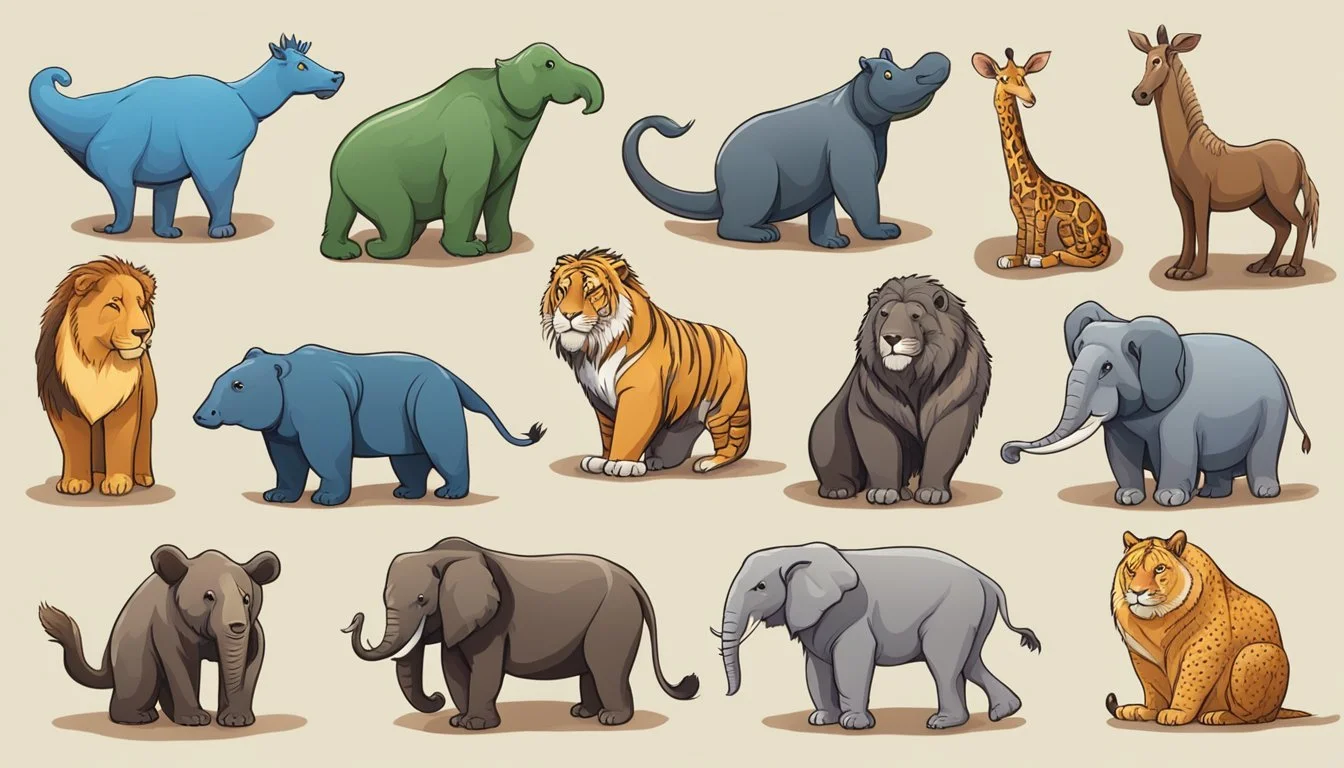Unlocking Self-Discovery: The 7 Personality Types You Need to Know
Personality types offer a framework for understanding human behavior and characteristics. These classifications provide insights into how individuals perceive the world, make decisions, and interact with others. By exploring different personality types, we can gain valuable self-awareness and improve our relationships with others.
The Enneagram system presents nine distinct personality types, each with its own set of traits, motivations, and fears. One of these, Type 7, is known as "The Enthusiast." This personality type is characterized by a zest for life, spontaneity, and a desire for new experiences. Understanding the various personality types can help individuals navigate personal and professional relationships more effectively.
1) The Enthusiast
The Enthusiast, also known as Enneagram Type 7, is characterized by an insatiable curiosity and zest for life. These individuals approach the world with wide-eyed wonder, always eager to experience new adventures and pleasures.
Enthusiasts possess a natural optimism that draws others to them. They exude infectious positive energy and tend to be non-judgmental, making them enjoyable companions in both professional and personal settings.
Type 7 personalities are driven by a desire to avoid pain and boredom. They focus their energy on seeking out excitement and novel experiences, often juggling multiple interests and activities simultaneously.
Enthusiasts are highly adaptable and productive. Their quick minds allow them to grasp new concepts rapidly, though they may struggle with follow-through on long-term projects due to their preference for variety.
While generally upbeat, Enthusiasts can become anxious when faced with limitations or negative emotions. They may use distractions or rationalization to avoid dealing with uncomfortable situations or feelings.
The Enthusiast's greatest strengths lie in their ability to inspire others, generate innovative ideas, and find joy in even the smallest aspects of life. Their enthusiasm can be a powerful motivating force for those around them.
2) The Investigator
The Investigator is a personality type characterized by their intense curiosity and desire to understand the world around them. These individuals are driven by an insatiable thirst for knowledge and a deep need to uncover the underlying mechanisms of various phenomena.
Investigators are often found in fields that require analytical thinking and research. They excel in areas such as science, technology, and academia, where their natural inclination to question and explore can be put to good use.
This personality type tends to be introverted and values their personal space. They often prefer solitude to social interaction, using their alone time to delve into their interests and pursue intellectual pursuits.
Investigators are known for their objectivity and logical approach to problem-solving. They rely heavily on facts and data, preferring to base their decisions on empirical evidence rather than emotions or intuition.
While their analytical skills are impressive, Investigators may struggle with social interactions and emotional expression. They sometimes find it challenging to connect with others on a personal level, as they prioritize intellectual discourse over small talk.
The Investigator's quest for knowledge can lead to groundbreaking discoveries and innovations. Their unique perspective and dedication to understanding complex systems make them valuable contributors in many fields.
3) The Achiever
The Achiever is a personality type characterized by ambition, drive, and a strong desire for success. These individuals are often highly motivated and goal-oriented, constantly striving to reach new heights in their personal and professional lives.
Achievers possess a natural talent for adapting to various situations and excel in competitive environments. They are typically pragmatic and results-focused, always looking for efficient ways to accomplish their objectives.
Image-consciousness plays a significant role in the Achiever's life. They often put great effort into presenting themselves in the best possible light, as they believe their outward appearance and reputation directly impact their success.
Achievers are known for their exceptional work ethic and ability to inspire others through their accomplishments. They thrive on recognition and validation, which fuels their motivation to continue pushing boundaries.
While Achievers are generally confident and self-assured, they may struggle with self-worth issues if they fall short of their lofty expectations. This can lead to a constant pursuit of external validation and difficulty finding contentment in their achievements.
4) The Reformer
The Reformer is a personality type characterized by a strong sense of purpose and a desire to improve the world. These individuals possess a keen eye for spotting flaws and imperfections in their surroundings.
Reformers are driven by a deep-seated need to uphold high standards and principles. They strive for excellence in all aspects of life and often hold themselves to impossibly high standards.
These individuals have a natural ability to see the bigger picture and identify areas that require change or improvement. Their strong sense of justice motivates them to take action and address societal issues.
Reformers are typically well-organized and disciplined. They approach tasks with a methodical mindset, paying close attention to details and striving for perfection.
While their intentions are usually noble, Reformers may sometimes come across as overly critical or judgmental. Their high expectations can lead to frustration when others don't meet their standards.
In professional settings, Reformers often excel in roles that require attention to detail and a commitment to quality. They thrive in environments where they can implement positive changes and make meaningful contributions.
5) The Individualist
The Individualist personality type is characterized by a deep desire for self-expression and identity creation. These individuals often feel they are missing a core sense of self and strive to invent or discover their unique identity.
Individualists tend to surround themselves with beauty and protect their fragile self-image. They are typically expressive, dramatic, and sometimes self-absorbed in their quest for authenticity.
Creativity plays a crucial role in the life of an Individualist. They often use artistic pursuits as a means of exploring and expressing their inner world, which they perceive as rich and complex.
Emotionally sensitive, Individualists may experience intense feelings but carefully manage which emotions they display to others. They can be temperamental and prone to mood swings as they navigate their inner landscape.
Individualists have a strong need to be seen and accepted for who they truly are. This drive for authenticity can sometimes lead to feelings of alienation or being misunderstood by others.
Despite their focus on individuality, Individualists may struggle with envy, comparing themselves to others and feeling they lack what others possess. This can fuel their ongoing search for a unique identity and personal significance.
6) The Helper
The Helper personality type is characterized by their strong desire to be loved and appreciated. They are known for their warmth, generosity, and eagerness to assist others.
Helpers are deeply empathetic and intuitive about people's needs. They often go out of their way to support those around them, finding fulfillment in making others happy.
These individuals are typically extroverted and thrive on social interactions. They excel at forming and maintaining relationships, using their charm and emotional intelligence to connect with others.
Helpers are often found in caring professions such as nursing, teaching, or counseling. Their natural inclination to nurture makes them valuable team members and friends.
While their intentions are usually pure, Helpers can sometimes struggle with setting boundaries. They may neglect their own needs in favor of others, leading to potential burnout or resentment.
At their best, Helpers are selfless, compassionate, and genuinely caring individuals who bring positivity to those around them. They have a unique ability to make others feel valued and understood.
7) The Peacemaker
The Peacemaker personality type is known for their calm and easygoing nature. They have a deep desire for harmony and avoid conflict whenever possible. These individuals excel at seeing multiple perspectives and finding common ground between opposing views.
Peacemakers often have a talent for mediating disputes and bringing people together. They tend to be excellent listeners and can make others feel heard and understood. Their empathetic nature allows them to connect with people from all walks of life.
While generally agreeable, Peacemakers may struggle with asserting their own needs and opinions. They sometimes neglect their own desires in favor of maintaining peace with others. This can lead to unresolved issues building up over time.
Peacemakers typically have a rich inner world and enjoy moments of quiet reflection. They may be drawn to spiritual or philosophical pursuits as a way to find inner tranquility. Many find solace in nature or creative endeavors.
In work environments, Peacemakers often thrive in supportive roles where they can facilitate cooperation. Their ability to remain calm under pressure makes them valuable team members during stressful situations.
Understanding the Big Five Model
The Big Five model provides a comprehensive framework for assessing personality traits. This scientifically-backed approach identifies five core dimensions that shape individual differences in behavior, thoughts, and emotions.
Overview of the Big Five Personality Traits
The Big Five personality traits, often referred to as OCEAN, consist of:
Openness to Experience
Conscientiousness
Extraversion
Agreeableness
Neuroticism
Each trait exists on a spectrum, with individuals falling somewhere between the extremes. Openness reflects curiosity and creativity. Conscientiousness relates to organization and reliability. Extraversion measures sociability and assertiveness. Agreeableness encompasses compassion and cooperation. Neuroticism represents emotional stability.
These traits are believed to have biological and environmental influences. Research suggests they remain relatively stable throughout adulthood, though some changes can occur over time.
How the Big Five Model Influences Personality Types
The Big Five model has significant implications for understanding personality types. Unlike categorical systems, it views personality as a combination of traits along continuous dimensions. This approach allows for more nuanced descriptions of individual differences.
High or low scores on each trait contribute to distinct personality profiles. For example, someone high in extraversion and openness might be outgoing and creative, while an individual high in conscientiousness and low in neuroticism may be organized and emotionally stable.
The model's flexibility accommodates the complexity of human personality. It recognizes that people can exhibit varying levels of each trait, resulting in unique combinations. This nuanced perspective helps explain why individuals may behave differently across various situations.
The Myers-Briggs Type Indicator (MBTI)
The Myers-Briggs Type Indicator (MBTI) is a widely used personality assessment tool that categorizes individuals into 16 distinct personality types. It aims to provide insights into how people perceive the world and make decisions.
History and Development of MBTI
The MBTI was developed by Isabel Myers and her mother, Katharine Briggs, during World War II. They based their work on Carl Jung's theory of psychological types, which proposed that people have innate preferences in how they process information and interact with the world.
Myers and Briggs created a questionnaire to make Jung's complex ideas more accessible and practical. They refined the assessment over several decades, eventually publishing the first MBTI manual in 1962.
The MBTI uses four dichotomies to determine personality type:
Extraversion (E) vs. Introversion (I)
Sensing (S) vs. Intuition (N)
Thinking (T) vs. Feeling (F)
Judging (J) vs. Perceiving (P)
Practical Applications of MBTI
The MBTI has found applications in various fields, including career counseling, team building, and personal development. Many organizations use it to improve communication and collaboration among employees.
In career counseling, the MBTI can help individuals identify professions that align with their personality preferences. For example, introverted thinkers might excel in roles requiring deep analysis and independent work.
Team leaders often use MBTI insights to create balanced groups and foster understanding among team members. By recognizing different personality types, teams can leverage diverse strengths and mitigate potential conflicts.
The MBTI also serves as a tool for personal growth, helping individuals understand their natural tendencies and develop strategies to work more effectively with others.


